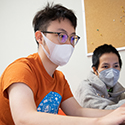Please give a brief, simplified overview of your research project.
How can we capture the evolution of scientific concepts and predict emerging research topics? The Science of Science (SciSci), a modern research area that studies the mechanisms underlying the doing of science via the lens of data science, offers a quantitative understanding of this question. One possible approach to Science of Science is to apply graphical models on big network datasets. More concretely, if we model each scientific concept as a node in a graphical network, we can apply graph theoretical tools to infer potential edges in the graph, a task commonly referred to as link prediction. That is, by exploring the structure of this graph network, we can infer connections between scientific concepts that are likely to emerge in the near future. Based on this intuition, Prof Ngoc Tran and I aspire to apply our expertise in graph theory and machine learning to achieve state-of-the-art accuracy in the link prediction task. This fall, we joined the 2021 Science4cast Data Competition, hosted by the Institute of Advanced Research in Artificial Intelligence, Vienna, Austria, to compare our proposed models with those by other leading research groups around the globe.
Describe the tasks you engage in as part of your work.
In this project, I review recent progress in innovative deep learning methods to model the embedding of the graph networks and apply them to our link prediction task. In this past month, luckily, equipped with my experience in graph theory and machine learning, I was able to quickly catch up with recent literature by completing a Stanford graduate course on graph neural networks on YouTube. At this stage, I am working on coding up these graph neural networks I learned and applying them to our dataset.
Describe what you thought college might be like before you came to UT. Did you consider research when thinking about college?
Before applying to UT, I wasn’t aware that undergraduate students could be involved in research. I thought college was mainly taking classes and participating in student organizations. However, I was very lucky to attend an undergraduate research info session hosted by the OUR office during my freshmen orientation. I was introduced to EUREKA, a UT database with various research opportunities open to undergraduate students.
How did you get involved with your research project?
Although I came to UT as a UGS student, I was fortunate to find my passion for data-driven mathematical research in my probability course with professor Ngoc Tran during my freshman year. I was excessively intrigued by the games of counting and coin tosses. At the end of the course, professor Tran kindly sent me an email recommending that I study mathematics. Since then, with the mentorship from professor Tran, I have worked on multiple direct reading and research projects in probability, machine learning, and pure mathematics.
Do you see your project connecting with your plans for your future?
I have been increasingly interested in graph theory and combinatorics since my undergraduate algorithms course, which I took during my sophomore year. Since then, I have taken multiple graduate courses on these topics and am eager to study them in graduate school. This project is thus a perfect one for me: not only does its graph-theoretical flavor extremely palatable, but it also incorporates my experience in machine learning. Throughout this project, I gained a deeper understanding of applied graphical models and their potential. I hope to explore more on this during graduate school too!
What is the most interesting or surprising thing you’ve gotten to do for this project?
Perhaps the Stanford course, I suppose. I never dreamt of binge-watching a graduate course online but that’s what I did. I was so fascinated by the subject that I finished the entire lectures series in two weeks.


